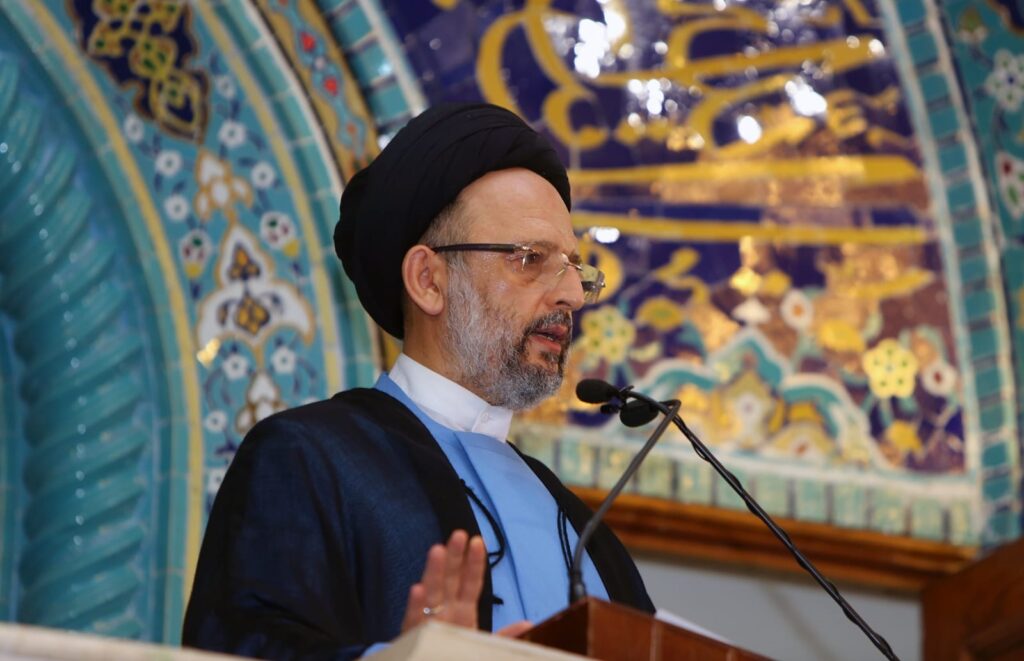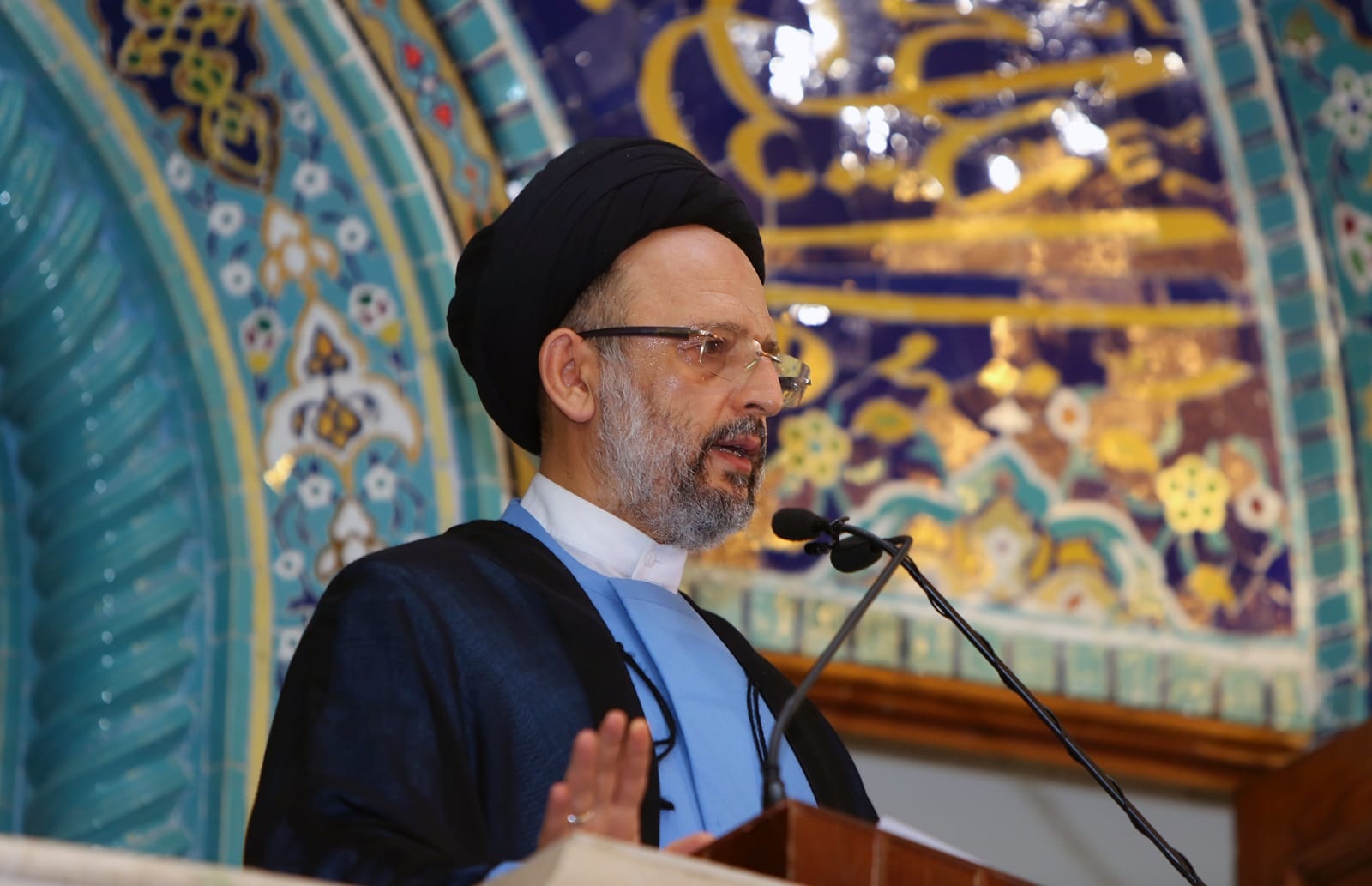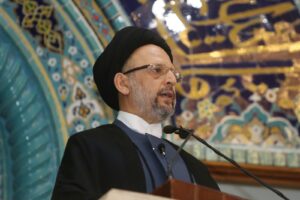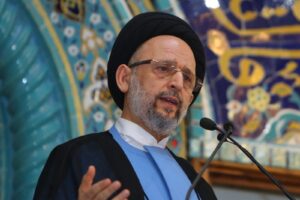In The Name of Allah, The Compassionate, The Merciful
.
.
.
His Eminence, Sayyed Ali Fadlallah, delivered the two Friday prayer sermons at the Imamain Al-Hassanain Mosquer,RAJAB 3, 1446/January 3, 2025. Several prominent religious scholars, dignitaries, and hundreds of believers attended the Jumu’a prayer. Following is a summary of the sermons.
Imam Al-Hadi (a.s): A Journey Filled with Suffering and Struggle
The First Sermon
Allah, the Most Exalted, says in His Holy Book: {And We made them leaders who guide by Our command, and We inspired them to do good deeds, to establish prayer, and to give charity, and they were worshippers of Us alone. Allah the Exalted speaks the truth
Today, on the third of Rajab, we commemorate a sorrowful day for the lovers and followers of Ahl al-Bayt (a.s.), the anniversary of the death of the tenth Imam ;Imam Ali ibn Muhammad al-Hadi. Those who lived with him described him as “the most delightful, truthful in speech, and the most beautiful from up close, and the most perfect from afar. When he was silent, dignity and reverence would radiate from him, and when he spoke, magnificence adorned him. He was from the house of the message, the Imamate…
Born in Medina, he lived under the care of his father, Imam al-Jawad (a.s.), for eight years. He passed away at the age of forty, buried in Samarra, having spent thirteen years in Medina and twenty years in Samarra.
Throughout his thirty-four-year Imamate, Imam Al-Hadi endured the oppression of six successive Abbasid caliphs, with the most severe suffering under Caliph Al-Mutawakkil, who harbored intense hostility towards Ahl al-Bayt (a.s.). Al-Mutawakkil summoned him from Medina to Samarra to keep him under surveillance after being told, “If you need to be powerful in Medina, expel Ali ibn Muhammad – Imam Al-Hadi – from it, for he has won the hearts of the people there.”
Despite this siege and repression, the Imam did not waver in his responsibility to preserve Islam and counter intellectual and doctrinal deviations. He relied on agents in various regions to maintain a connection with his followers, who were disguised as traveling salesmen to avoid Abbasid persecution.
Today, we will take this opportunity to reflect on some of his dialogues and Hadiths.
The first Hadith is from Abu Da’ama, a companion of the Imam (a.s.), who said: “I visited Ali ibn Musa al-Hadi during the illness, which led to his death. When I was about to leave, he said to me, ‘O Abu Da’ama, you have a right over me – look at the Imam on his deathbed, fulfilling his role in guidance and instruction, which he saw as a right for people and a duty upon him – I will tell you a Hadith that will bring you joy.’ I said: ‘How much I need that, O son of the Messenger of Allah!’ He said: ‘My father told me from his fathers from the Commander of the Faithful , who said: “The Messenger of Allah (p.) told me: O Ali, write.” I said: “What should I write?” He said: “Write: In the name of Allah, the Most Merciful, the Most Compassionate. Faith is that which is settled in the hearts and confirmed by deeds, and Islam is that which is spoken by the tongue and what establishes marriage.”‘
The Imam (a.s.) aimed to explain to his companion and us that it is sufficient for a person to be a Muslim to declare the two testimonies – that there is no god but Allah and that Muhammad is the Messenger of Allah – and by announcing their affiliation with Islam. However, to be a believer, the religion must enter their mind, build their emotions, feelings, and actions, and be reflected in their behavior. The Qur’an rejects the claim of the Bedouins: ‘We believe,’ because faith had not entered their minds, nor influenced their behavior. Instead, The Glorious Book told them: {The Bedouins said, ‘We believe.’ Say, ‘You have not believed; but say, ‘We have submitted ,’ ( we have become Muslims) for faith has not yet entered your hearts.}[Al-Hujurat: 14], and Islam in this context means declaring the two testimonies.
In the Hadith, it is stated: ‘Faith and action are twin brothers, inseparable companions. Allah does not accept one without the other.’
Thus, the reference to the believer is mentioned in the verse: {The believers are only those who, when Allah is mentioned, their hearts become fearful, and when His verses are recited to them, it increases them in faith; and upon their Lord they rely. Those who establish prayer and spend from what We have provided for them. Those are the believers, truly. For them are degrees [of high position] with their Lord and forgiveness and noble provision.}
In another Hadith, it is said: ‘The believer is the one whom the Muslims entrust with their wealth and lives,’ and ‘The believer’s soul is in toil, but the people are in ease from him.’
The second Hadith is from Ibn al-Sikait, a scholar of the Arabic language, who met with Imam al-Hadi and asked him: ‘Why was Moses(Musa), the son of Imran, sent with a staff and a white hand and magical tools, while Jesus was sent with medicine, and Muhammad (p.) was sent with speech and sermons?’ Imam al-Hadi replied: ‘Allah, the Exalted and Glorified, sent Musa at a time when magic was predominant among the people of his era. He came to them from Allah with what they could not match, nullifying their magic, and establishing proof against them. Allah sent Jesus during a time of widespread diseases when people needed medicine. He came to them from Allah with what they did not have, giving life to the dead, healing the blind and the leper by Allah’s permission, and establishing proof against them. Allah sent Muhammad during a time when speech, poetry, and eloquence were predominant among the people of his era. He came to them with the Book of Allah, sermons, and rulings, nullifying their words, and establishing proof against them.’ Ibn al-Sikait then said: ‘By Allah! I have never seen anyone like you today. What is the argument against the created today?’ The Imam said: ‘The mind; through it, the truthful one is known to be truthful, and the liar is known to be lying.’ Ibn al-Sikait then said: ‘By Allah, this is the answer.’
The Imam wanted to emphasize the important role that Islam assigns to the mind, making it Allah’s argument against His creation. Through it, they reach faith, believe in what Allah revealed, what the Messenger of Allah called for, and what the Imams of Ahl al-Bayt brought. This is indicated in the sacred Hadith: ‘When Allah created the mind, He made it speak. Then He said to it, “Come forward,” and it came forward. Then He said to it, “Go back,” and it went back. Then He said, “By My might and majesty, I have not created anything more beloved to Me than you. Through you, I command, through you, I prohibit, through you, I reward, and through you, I punish.”‘
The third Hadith mentioned in this context is another conversation with Ibn al-Sikait, who asked the Imam: ‘Why does the Qur’an only become fresher with dissemination and study?’ – meaning it is always new and vibrant, capable of keeping up with all eras and times, despite being revealed in a past era. The Imam (a.s.) replied: ‘Allah, the Exalted, did not make it for a specific time without another, nor for a specific people without another. It is new in every era and fresh for every people until the Day of Resurrection.’
The Holy Qur’an is like the sun and the moon, night and day; just as the sun and the moon renew to give us light every day, continuously, in every land, so does the Holy Qur’an renew itself to illuminate our paths in every era and on every land, and it will continue to do so until Allah inherits the earth and everyone on it…
Dear ones, this is Imam Al-Hadi , who filled his era with worship, knowledge, action, struggle, dedication, giving, and advice. His character attracted the hearts of all people. Can we, who are committed to him, rise to his level to be like him and follow his path? Can we be, as he wanted, an adornment for him, not a disgrace, solidifying our connection to Allah, realizing our affiliation with him, and our loyalty to him? We can only achieve this by striving in obedience to Allah and abstaining from His disobedience.
The second semon
Worshippers of Allah, I advise you and myself to revive this blessed month that has just begun, which the Messenger of Allah highlighted its significance, saying: “Rajab is the great month of Allah, no other month compares to it in sanctity and virtue.”
This month is one of the four sacred months in which Allah has decreed peace for individuals, communities, and nations. Wars cease, conflicts freeze, and disputes cool down, indicating that the principle in Islam is peace. A third of the year is designated as months of peace, and the principle of peace is extended to the rest of the year. It is a month of worship through prayers, fasting, remembrance, reading the Qur’an, and charity. Good deeds are multiplied in this month…
As the new Gregorian year begins, the Lebanese hope it brings signs of relief from their suffering, caused by the aggression of the Zionist enemy, which led to massive destruction in buildings, institutions, lands, and crops, especially in the southern suburbs, the South, and the Bekaa. Many martyrs were lost, and many were left disabled or displaced.
Lebanese people remain anxious about the possibility of renewed war, with its tragedies they do not wish to see repeated. The enemy continues its violations, bombing houses in occupied towns, expanding into villages it had not reached, and carrying out airstrikes, the latest in Iqlim al-Tuffah. Media leaks and statements from enemy leaders suggest continued aggression, claiming Lebanon has not fulfilled its part of the agreements. This anxiety is heightened by the extension of the return of northern settlers by two more months and the lack of clear, pressing positions from the ceasefire committee to hold the enemy accountable. Sure, here is the translation of your text:
And on this front, despite all these breaches and intimidations through which the enemy seeks to blackmail Lebanon into concessions that would affect the Resistance and the country’s independence, we see that there is no fear for the agreement from what is happening. It has become clear that the enemy has an interest in implementing it, and that it has no choice but to comply for the return of its settlers to the north. Despite all the destruction it caused during the war, it failed to return them to their homes and ensure their safety, and it will fail if it tries again. Moreover, its presence on Lebanese lands will grant the Resistance national and international legitimacy to continue the role it has taken on itself since its inception. It has openly declared that it will continue this role if the enemy does not withdraw from Lebanese lands and does not comply with the terms of the agreement signed between it and the Lebanese state.
However, this does not mean that we should not be cautious of the treachery of this enemy, which might risk continuing the aggression to achieve the goals it declared at the beginning of the war and failed to achieve, betting on variables that it sees as serving its interests, whether at the regional level or after the new American president takes office to impose additional conditions on Lebanon.
The second matter Lebanese people look forward to in the new year is the presidential election scheduled for January 9th. This is crucial for stabilizing the country and ensuring the proper functioning of institutions, starting with forming a legitimate government to address pending issues and begin reconstruction.
In Syria, we hope for a nation enjoying security, unity, and stability, which can only be achieved through the cooperation of all its components, ensuring no sect or political faction feels marginalized. This will enable the country to face internal challenges and the continuous threats from the Zionist enemy.
In Gaza, we hope the new year marks the end of the ongoing genocide by the Zionist enemy. We salute the resistance, bravery, and resilience of the people of Gaza and call on Arabs, the international community, and freedom lovers to raise their voices in support of their right to live with dignity in their homeland…





